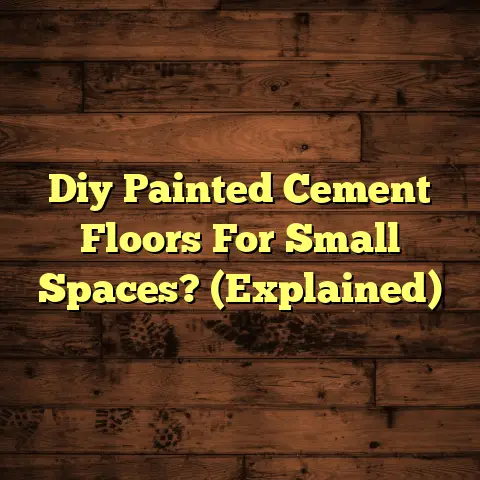How Much Does Nature Stone Flooring Cost (Explained)
When it comes to flooring options, Nature Stone is a unique choice that combines the natural beauty of stone with the durability and ease of maintenance needed in today’s homes and commercial spaces.
Understanding the costs associated with installing Nature Stone flooring can help you make informed decisions about whether it’s the right fit for your project.
This article will delve into the various factors impacting the cost, provide detailed breakdowns, and compare it with hardwood and other flooring options.
Overview of Major Cost Factors
The cost of installing Nature Stone flooring can vary widely based on several key factors:
1. Area Size
The size of the area to be covered is one of the most significant cost determinants.
Larger areas will generally have a lower cost per square foot compared to smaller areas due to economies of scale.
2. Type of Stone
Nature Stone offers a range of options, including different types of aggregates.
The choice of stone influences both the price and aesthetics.
3. Labor Costs
Labor costs can vary depending on your location, the complexity of the installation, and the experience level of the contractors.
Professional installation is typically recommended for Nature Stone due to the specific techniques involved.
4. Subfloor Preparation
If your existing floor requires removal or if the subfloor needs repairs or replacement, this will add to your overall costs.
5. Material Grade
The quality and grade of materials selected will impact pricing significantly.
Higher-grade stones and finishes will come at a premium.
6. Installation Type
Different installation methods (e.g., direct application vs.
overlay) can affect both the price and the final look of your flooring.
7. Room Size/Layout
Complex layouts or rooms with many corners and curves can require more labour-intensive installation techniques, increasing costs.
Detailed Cost Breakdown
Here’s a detailed look at the estimated costs associated with installing Nature Stone flooring.
Cost per Square Foot
- Material Costs: Generally range from $5 to $15 per square foot, depending on the type and quality of stone.
- Labor Costs: Installation typically ranges from $3 to $8 per square foot.
- Total Cost (Material + Labor): For a typical installation, expect to pay between $8 to $23 per square foot.
Price Ranges for Different Project Sizes
- Small Project (100 sq ft):
- Total Estimated Cost: $800 – $2,300
- Medium Project (500 sq ft):
- Total Estimated Cost: $4,000 – $11,500
- Large Project (1,000 sq ft):
- Total Estimated Cost: $8,000 – $23,000
Comparing Nature Stone to Other Flooring Options
When considering flooring options, it’s vital to compare costs and benefits alongside Nature Stone.
Here’s how it stacks up against hardwood, laminate, vinyl, and carpet:
Signs that Hardwood Floors Need Replacement
While we are focusing on Nature Stone here, many homeowners might also consider hardwood flooring.
Recognizing when hardwood floors need replacement can save money in the long run.
Consider these signs:
- Severe Scratches or Gouges: If refinishing doesn’t restore the surface.
- Cupping or Warping: Caused by moisture damage.
- Excessive Squeaking: Indicates structural issues.
- Discoloration: Significant fading or stains that cannot be removed.
Refinishing vs Replacement
Refinishing is often a viable option if your hardwood floors are in decent shape but require aesthetic improvements.
However, if structural issues exist or if they are beyond repair, replacement may be necessary.
Pros and Cons of Nature Stone Flooring
Pros:
- Durability: Highly resistant to wear and tear.
- Low Maintenance: Easy to clean and does not require frequent replacement.
- Aesthetic Appeal: Offers a unique look that can enhance any space.
- Eco-Friendly Options: Many materials are sustainably sourced.
Cons:
- Initial Costs: Higher upfront cost compared to some alternatives.
- Professional Installation Required: May increase overall expenses.
- Cold Underfoot: May not be as warm as carpet or hardwood.
Cost Differences: Professional Installation vs DIY
While DIY installation might seem like a way to save money, consider these factors:
Professional Installation:
- Costs: Typically adds $3 – $8 per square foot.
- Skills Required: Professionals possess the experience necessary for proper installation.
- Tools Needed: Specialized tools may be required for DIY installations.
DIY Installation:
- Potential Savings: Can reduce labor costs significantly.
- Learning Curve: Requires knowledge about materials and techniques.
- Time Investment: DIY projects can take longer than expected.
Questions to Ask Hardwood Flooring Contractors
If you decide to hire a professional for your Nature Stone installation or any other flooring project, consider asking these questions:
- What is your experience with Nature Stone flooring?
- Can you provide references from previous clients?
- What is included in your estimate?
- Do you offer any warranties or guarantees?
- How do you handle unexpected issues during installation?
- What is your timeline for completing the project?
Hardwood Floor Care and Maintenance Tips
To maximize the longevity of your hardwood floors, consider these maintenance tips:
- Regular Cleaning: Sweep or vacuum regularly to remove dirt and debris.
- Moisture Control: Use mats in entryways and control humidity levels in your home.
- Refinishing Periodically: Depending on wear, consider refinishing every 5–10 years.
- Avoid Harsh Chemicals: Use ph-neutral cleaners specifically designed for wood floors.
- Protective Measures: Use felt pads under furniture to prevent scratches.
Conclusion
Understanding the costs associated with Nature Stone flooring—from materials to installation—can empower you to make an informed decision for your next flooring project.
Whether you’re considering it for your home or business, remember to weigh it against other options like hardwood, laminate, vinyl, and carpet to find what suits your needs best.
By keeping in mind factors like area size, stone type, labor costs, and maintenance considerations, you’ll be well-equipped to choose flooring that not only enhances your space but also fits within your budget.
Happy flooring!





